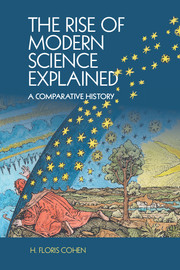Book contents
- Frontmatter
- Contents
- Introduction: the Old World and the New
- 1 To begin at the beginning: nature-knowledge in Greece and China
- 2 Islamic civilisation and medieval and Renaissance Europe
- 3 Three revolutionary transformations
- 4 A crisis surmounted
- 5 Expansion, threefold
- 6 Revolutionary transformation continued
- Epilogue: a look back and a look ahead
- Timeline 1: pre-1600
- Timeline 2: 1600–1700
- A note on the literature
- Provenance of quoted passages
- Index
Epilogue: a look back and a look ahead
Published online by Cambridge University Press: 05 March 2016
- Frontmatter
- Contents
- Introduction: the Old World and the New
- 1 To begin at the beginning: nature-knowledge in Greece and China
- 2 Islamic civilisation and medieval and Renaissance Europe
- 3 Three revolutionary transformations
- 4 A crisis surmounted
- 5 Expansion, threefold
- 6 Revolutionary transformation continued
- Epilogue: a look back and a look ahead
- Timeline 1: pre-1600
- Timeline 2: 1600–1700
- A note on the literature
- Provenance of quoted passages
- Index
Summary
Does it matter whether we characterise what happened in seventeenth-century nature-knowledge as a revolution, or refrain from using that loaded term?
In one sense, of course not. ‘Revolution’ is just a word, with changing meanings which up to a point we may determine ourselves.
Nevertheless, we have in the course of this book come across several criteria that might help us to decide whether or not it makes good historical sense to keep speaking of ‘The Scientific Revolution of the seventeenth century’.
A VERITABLE REVOLUTION?
Take for starters the vast contrast between the state of nature-knowledge in 1600 and that one century later. It is vast in terms of reining in ‘fansy’ which we discussed at length when exploring the different ways in which the seventeenth-century pioneers of a radically new conception of the natural world sought to confirm the validity of their conclusions without resorting, as in the past, to hoary dogmatic certainties or conversely lapsing into all-encompassing sceptical doubt. In realist-mathematical science, the interaction between mathematics and experiment appeared to offer the prospect of a progression of often valid, sometimes wrong, but as a rule well-testable conclusions. In exploratory-experimental science, numerous artful devices were tried out to pin nature down in all its capricious unpredictability; at the end of the century, Newton made the criteria for this even more demanding. In short, nature-knowledge in the seventeenth century served, as it were, as a laboratory for finding out how to probe specific truth claims (whether made by oneself or by anyone else) in a spirit of methodical distrust. It goes a little too far perhaps to follow Popper here without more ado and ascribe ‘falsifiability’ to the pursuit of nature-knowledge in the seventeenth century, yet an implicit sense of human fallibility and a determination to make it operative (that is the new thing) are clearly taking over as the century proceeds.
The contrast between 1600 and 1700 is also vast in terms of substantive content. The Earth turns. Our blood circulates. The air that we breathe has weight. A void space can be created. Objects that are attracted by the Earth fall to the ground with uniform acceleration. White light is composed of all the colours of the rainbow. Unequal cross-sections of a river discharge equal quantities of water in equal periods of time.
- Type
- Chapter
- Information
- The Rise of Modern Science ExplainedA Comparative History, pp. 256 - 278Publisher: Cambridge University PressPrint publication year: 2015



